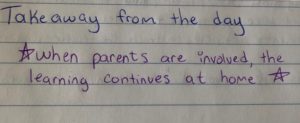On October 23 I was lucky enough to take part in the C2C conference hosted in Prince George. Within that conference I chose to take part in three different workshops with different focus topics in order to broaden my knowledge as much as possible.
The first workshop I took part in was called “Land Based Libraries: Our Stories Live Here” and the focus was on Indigenous stories and the stories that the land tells. On this spectrum there is a respect as to which stories we do not have the privilege to tell even if we have heard them before, it may not be our place to repeat them. In some cases, when young children are involved teachers may have trouble when it comes to understanding and fully grasping the concept or “take-away” from the story and this is where bringing in a guest speaker to tell those stories can help because the speaker can go into further explanations because they hold knowledge that we do not.
In the second workshop I was able to listen to a WONDERFUL presentation about place-based learning and the hurdles we may run into as well as benefits and further recommendations for learning. When we take time to incorporate place based learning into our lesson plans it triggers an interest in nature, uses mother nature as a teacher, teaches food security, and fosters interconnectedness to nature, each other, traditional ecological knowledge, Indigenous ways of knowing/world views. A few of the hurdles teachers face are transportation costs, Chaperone and EA support, Finding the time for trips, Ensuring proper supplies are provided for trip ( nets, magnifying glasses) and making sure all students have proper gear for weather. Going forward some things to think about are focus schools, consistent effort from teachers and administrators to make outside learning possible, accessible outdoor environments and most important funding!
The final workshop of the day highlighted the SEAS program (Supporting Emerging Aboriginal Stewards) in Klemtu which is home to Kitasoo Community School. The group from this school included staff members, summer program directors and students that spoke to their experiences in both the school and sought-after SEAS program. The SEAS summer internship was made to help develop identity while promoting stewardship and connection to core competencies via grounding in place and investing in youth; this is considered a head start into their culture. This type of curriculum is based on resources from land and sea and considers the land as more than a “backyard” and focuses on the knowledge exchange that comes from being out in the waters and land. The biggest challenge that this community faces is finding a dedicated group of people with a similar long-term vision with a stable source of income. The Community School forms its curriculum around being able to learn off the land and from the elders by taking the students to harvest food that is local to their area. This learning opportunity allows the students to bring the food to their families and share it with their community, therefore, building those strong community connections that are a necessity in First Peoples Principles of Learning. My biggest “take-away” from this professional development day was a quote from my last workshop and highlighted the needs for community connections and connections at home, “When parents are involved…The learning continues at home.”
